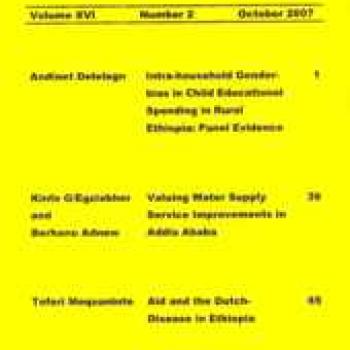
Studies in developed countries indicate that preschool education can have strong impact on children's cognitive development, but there are no studies conducted in the context of developing countries including Ethiopia where pre-school education is left for private sector. To see if government investment in pre-school education is worth, we examined the effects of early childhood education attendance on cognitive development of preschool age children. Using data obtained from the Young Lives Longitudinal Survey in Ethiopia, we measured cognitive development of children by Peabody Picture Vocabulary Test (PPVT) and Cognitive Development Assessment-Quantity (CDA-Q) Test. We employed standard instrumental variable estimation, Wooldridge instrumental variable estimation and propensity score matching techniques to see the degree of association between preschool enrolment and cognitive outcome of five years old children. Across all these models, the results persistently show that early childhood education attendance is positively associated with children's cognitive development. More specifically, from propensity score matching result, children who have been attending preschool education have scored 31.2% higher in vocabulary test and 23.1 % in quantitative test than those of non-preschool attendees. The implications of these results are quite crucial and timely for the Ethiopian government. Despite the fact that preschool education increases children's cognitive development, public investment in this critical stage of education is currently very low in the country and left for the private sector. As a result, the subsector is dominated by fee charging kindergartens in which children from low socioeconomic background do have very little opportunity to attend this fist and critical stage of education implying that government has to do more in this first and essential stage of education.

Studies in developed countries indicate that preschool education can have strong impact on children's cognitive development, but there are no studies conducted in the context of developing countries including Ethiopia where pre-school education is left for private sector. To see if government investment in pre-school education is worth, we examined the effects of early childhood education attendance on cognitive development of preschool age children. Using data obtained from the Young Lives Longitudinal Survey in Ethiopia, we measured cognitive development of children by Peabody Picture Vocabulary Test (PPVT) and Cognitive Development Assessment-Quantity (CDA-Q) Test. We employed standard instrumental variable estimation, Wooldridge instrumental variable estimation and propensity score matching techniques to see the degree of association between preschool enrolment and cognitive outcome of five years old children. Across all these models, the results persistently show that early childhood education attendance is positively associated with children's cognitive development. More specifically, from propensity score matching result, children who have been attending preschool education have scored 31.2% higher in vocabulary test and 23.1 % in quantitative test than those of non-preschool attendees. The implications of these results are quite crucial and timely for the Ethiopian government. Despite the fact that preschool education increases children's cognitive development, public investment in this critical stage of education is currently very low in the country and left for the private sector. As a result, the subsector is dominated by fee charging kindergartens in which children from low socioeconomic background do have very little opportunity to attend this fist and critical stage of education implying that government has to do more in this first and essential stage of education.

